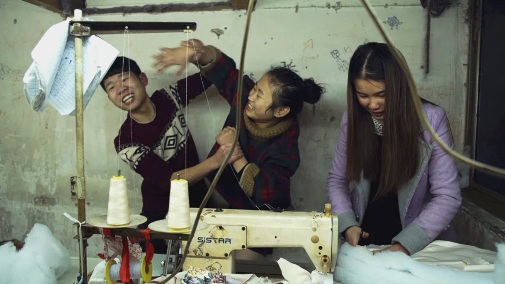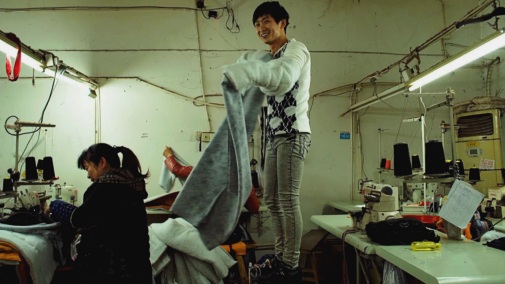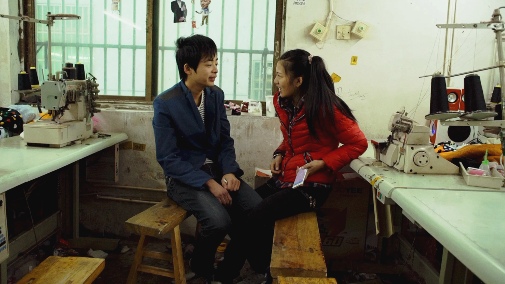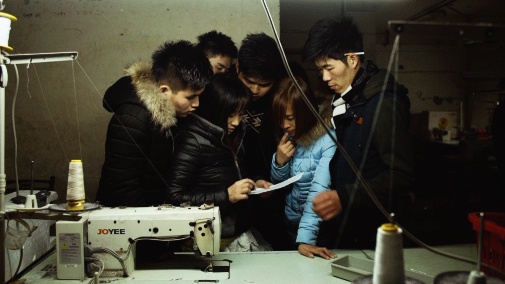TIFF '23: “Youth (Spring)” brings notes of optimism to Wang Bing’s cinema
 Wednesday, September 13, 2023 at 7:30PM
Wednesday, September 13, 2023 at 7:30PM 
Over a decade ago, Wang Bing’s first film explored the decline of an industrial district, state factories dying away as privately-owned businesses took over the Chinese economy. Since Tie Xi Qu: West of the Tracks, the director has applied the same ‘fly on the wall’ technique to various other projects, each growing in size until his filmography resembles a collection of non-fiction epics. The 2002 picture clocked at over nine hours, edited down from 200 hours of footage. For his most recent endeavor, Wang recorded 2,600 hours of material, deciding to present it as a trilogy named after one of the most exploited demographic in the nation’s industry – Youth. The three-and-a-half-hour Youth (Spring) represents the first chapter in the director’s new opus, introducing new tonalities to his work…

The arc of Wang Bing’s filmography can be traced in the same breath as one considers Chinese economic developments in the 21st century. West of the Tracks pondered the death of a socialist dream, pouring over the memory of a past when factory work was a collective activity oriented around national goals. The film wasn’t mourning what was lost, but neither did it look positively to what was to come. As the years go by, his camera has moved from ghost towns to the private factory. The decentralization of industry didn’t eliminate government-overseen labor, but it’s hard to penetrate the places where it happens and near impossible to film.
So, his attention drifted to migrants within the vastness of China, following rural populations who leave their countryside homes, relocated to cities made out of small factories and even smaller workers’ dormitories. The path to Youth started away from the industrial metropolis. Instead, it all began in rural Yunnan, where Wang Bing shot Three Sisters. When girls he met during that shoot went to live in the town of Zhili, near Shanghai, he followed their movement in what became his 2016 doc Bitter Money. As the title suggests, bitterness dominates that work, the older generations anguishing over the dead end of exploitation their lives became. Lyric elegance stops it from being a punitive watch, but it sits perilously close to the abyss.
During that process, another reality blossomed in front of the director’s camera. For the young who sell their physical labor for a pittance, despondency isn’t as insidious or generalized. With his new film Wang Bing’s gaze encounters inklings of levity and high spirits, romantic melodrama interwoven with the rhythmic patterns of garment manufacturing, and an unlikely strain of optimism. This is evident from minute one, as the film drops us right in the middle of another day in the lives of a workshop crew, every individual in their late teens or early twenties.
They formulate games to pass the time and make the labor tolerable, racing to see who completes the biggest number of seams faster. Such jests dominate the opening segment, setting the tone for a film whose youthfulness tends to temper desolation. Another parallel grace comes from the attention to detail when capturing the process by which cloth becomes clothes, imbuing mass-produced objects with unexpected humanity. Joy and hypnosis hold hands, twisting the long-form documentary until it can be called one of the most accessible watches in the director’s oeuvre.

Where most of Wang Bing’s projects are bottomless pits of despair, Youth (Spring) finds hope, the outlook of the young spreading infectious through the fabric of the film. Rather than regard this attitude with paternalism, the director seems to treasure the workers’ spirit. Their light isn’t seen as foolish or naïve but as an admirable trait, maybe the most crucial survival skill for those hoping to thrive in modern China. Notice how the camera follows the young people from workshop to dormitory and out into the street, probing their quotidian with a keen and gentle eye, eager to recognize the small joys hidden within economic vulnerability.
It’s an observational practice that tries to expose systemic exploitation without reducing its subjects to their plight, a political gesture tempered by humanism. It’s almost as if a breeze of fresh air runs through the cinematic edifice, the workers’ vitality a balm for an audience whose patience may be straining and whose heart can’t take another beating. There’s even humor to be found, odd as it sounds.
At other times, the ruling austerity of Wang’s cinema gets destabilized by another sort of emotional surge. The sweltering interior of the workshop is like a powder keg, forced proximity turning each feeling volatile. The most minimal of sparks is all that’s needed to ignite the fuel – explosions are inevitable. Oh, how quickly a young man’s playful banter escalates into aggression, a provocation for a fight. You can practically smell the hormones permeating the shared air, the flower of youth so prone to combustion when cooped up like this.
Still, the director’s collective approach to his subjects and structural gambits also lead to a sense of cyclical echoes. The film’s focus jumps from workshop to workshop, finding the same dynamics everywhere it looks. No individual workers assert protagonism, underlining the repetition inherent to the documentary’s shape. Like its soundtrack of ever-buzzing machines, Youth (Spring) makes the same motion over and over again, stuck in ad nauseam circles. Intellectually, it makes sense for a film about monotonous activity to replicate the experience in its form. Nevertheless, it tests the limits of engagement on the viewer’s part, and it’ll be hard to fault those who give up on Wang Bing’s vision halfway through.

Between Cannes and Toronto, Youth (Spring) has picked up US distribution. It’ll be released by Icarus Films.
 Asian cinema,
Asian cinema,  China,
China,  TIFF,
TIFF,  Wang Bing,
Wang Bing,  Youth (Spring),
Youth (Spring),  documentaries,
documentaries,  film fesivals,
film fesivals,  foreign film
foreign film 


